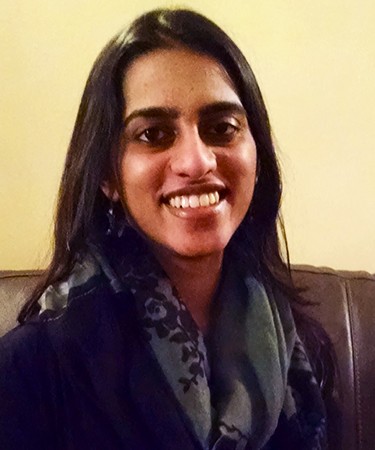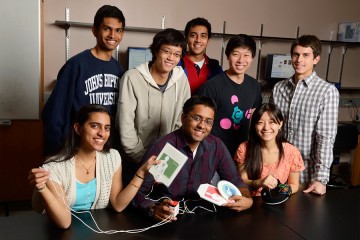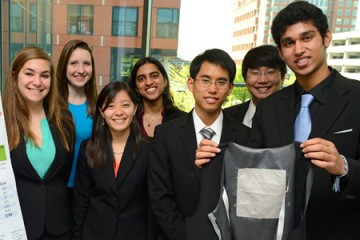Sandya Subramanian, a Johns Hopkins University senior from Grand Rapids, Mich., has won a scholarship from the Winston Churchill Foundation of the United States for graduate study at England's University of Cambridge.

Image caption: Sandya Subramanian
The Churchill Scholarship is awarded annually to at least 14 students who have demonstrated a capacity to contribute to the advancement of knowledge in the sciences, engineering, or mathematics by completing original, creative work at an advanced level. Subramanian is the fifth Johns Hopkins winner in the past four years.
Subramanian, who is majoring in biomedical engineering and applied math and statistics, hopes to become a computational neuroscience researcher, devising tools to help clinicians treating the brain. For three years, she has worked lab of Sridevi V. Sarma, an assistant professor in the Department of Biomedical Engineering's Institute for Computational Medicine. There she developed a tool to help doctors pinpoint the region of the brain responsible for seizures in people with epilepsy.
"Of all the undergraduate students I have supervised in research, Sandya is by far the most precocious, talented, hardworking, and diligent student—and this is significant given the talented student pool [of the university's biomedical engineering students]," Sarma said. "There is no doubt in my mind that Sandya has a remarkable ability to be innovative and conduct original research that will have a high impact on the field of neuroscience, computational medicine, and patients suffering from epilepsy."
At Cambridge, Subramanian plans to continue exploring the brain through new research projects in the Department of Clinical Neurosciences.
"It will be a first step for me as an independent researcher," she said. "This is an amazing opportunity that so few people get."
Subramanian has already spent summers in research programs at both the Massachusetts Institute of Technology and the National Institutes of Health.
Donniell Fishkind, an associate research professor in the Department of Applied Mathematics and Statistics at Johns Hopkins, recruited Subramanian to be one of his teaching assistants. He recalled that one day when he unexpectedly missed a class session, Subramanian, undaunted, gave part of the lecture—to 130 students.
"Her quantitative background is unusually strong, she is very quick to grasp complex ideas, and she is also very clever," Fishkind said. "She is well-prepared for conducting serious research, and she has successfully started down that road."
While at Johns Hopkins, Subramanian performed for four years with the South Asian fusion a cappella group Kranti. A certified emergency medical responder in the state of Maryland, she also volunteered with the 24/7 campus emergency response unit. And invention that she helped create with fellow engineering students that improves the way lifesaving shocks are delivered to the heart took first prize at the Collegiate Inventors Competition in 2013 and last year at the North American Professionals and Entrepreneurs Council Innovation Challenge. Subramanian also led a student team that developed a lightweight, wearable defibrillator garment to deliver lifesaving shocks to patients experiencing serious heart problems.
The Winston Churchill Foundation was established in 1959, the same year that Churchill College at the University of Cambridge was established as the national and Commonwealth tribute to Sir Winston Churchill. The first three Churchill Scholarships were given in 1963. The one-year Churchill Scholarship pays all university and college fees (ranging from $33,500 to $37,600), a living allowance (ranging from $17,700 to $21,000), transportation to and from the United Kingdom (up to $1,100), student visa expenses ($500), a travel award of $500, and a possible special research grant of up to $2,000. Depending on the field of study, the scholarship is worth between $57,000 and $63,600.









